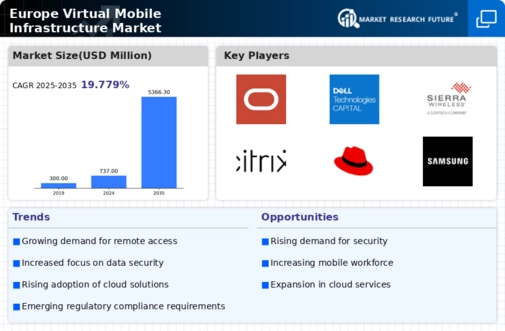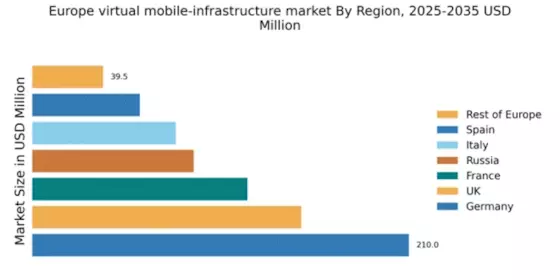Germany : Strong Growth and Innovation Hub
Key markets include Berlin, Munich, and Frankfurt, where major players like VMware, Microsoft, and IBM have established significant operations. The competitive landscape is characterized by a mix of local startups and global giants, driving innovation and service diversification. The business environment is favorable, with a strong emphasis on sectors such as finance, automotive, and telecommunications, which are increasingly adopting virtual mobile solutions.
UK : Innovation and Investment Drive Market
London, Manchester, and Birmingham are pivotal markets, hosting major players like Citrix Systems and Microsoft. The competitive landscape is vibrant, with numerous tech startups and established firms vying for market share. The local business environment is characterized by a strong emphasis on fintech, healthcare, and education sectors, which are increasingly leveraging mobile infrastructure solutions to enhance service delivery.
France : Strong Demand and Regulatory Support
Key markets include Paris, Lyon, and Marseille, where major players like IBM and Microsoft are actively expanding their presence. The competitive landscape features a mix of local and international firms, driving innovation and service offerings. The business environment is favorable, particularly in sectors such as public administration, healthcare, and retail, which are increasingly adopting mobile infrastructure solutions to improve efficiency and service delivery.
Russia : Regulatory Landscape and Demand Trends
Moscow and St. Petersburg are key markets, with significant presence from players like Huawei and ZTE Corporation. The competitive landscape is evolving, with local firms gaining traction alongside international giants. The business environment is complex, influenced by regulatory policies and economic conditions, particularly in sectors such as telecommunications, energy, and manufacturing, which are increasingly adopting mobile infrastructure solutions.
Italy : Digital Transformation and Investment Focus
Key markets include Rome, Milan, and Turin, where major players like Microsoft and IBM are expanding their operations. The competitive landscape features a mix of local and international firms, driving innovation and service diversification. The business environment is characterized by a strong emphasis on sectors such as manufacturing, retail, and public administration, which are increasingly leveraging mobile infrastructure solutions to enhance efficiency and service delivery.
Spain : Investment in Digital Infrastructure
Key markets include Madrid and Barcelona, where major players like VMware and Microsoft are actively expanding their presence. The competitive landscape is characterized by a mix of local startups and established firms, driving innovation and service offerings. The business environment is favorable, particularly in sectors such as tourism, retail, and telecommunications, which are increasingly adopting mobile infrastructure solutions to improve service delivery.
Rest of Europe : Varied Growth Across Sub-regions
Key markets include cities in Scandinavia, Eastern Europe, and the Balkans, where local players and international firms are vying for market share. The competitive landscape is diverse, with varying levels of market maturity and innovation. The business environment is influenced by sector-specific applications, particularly in industries such as logistics, healthcare, and education, which are increasingly adopting mobile infrastructure solutions to enhance service delivery.

















